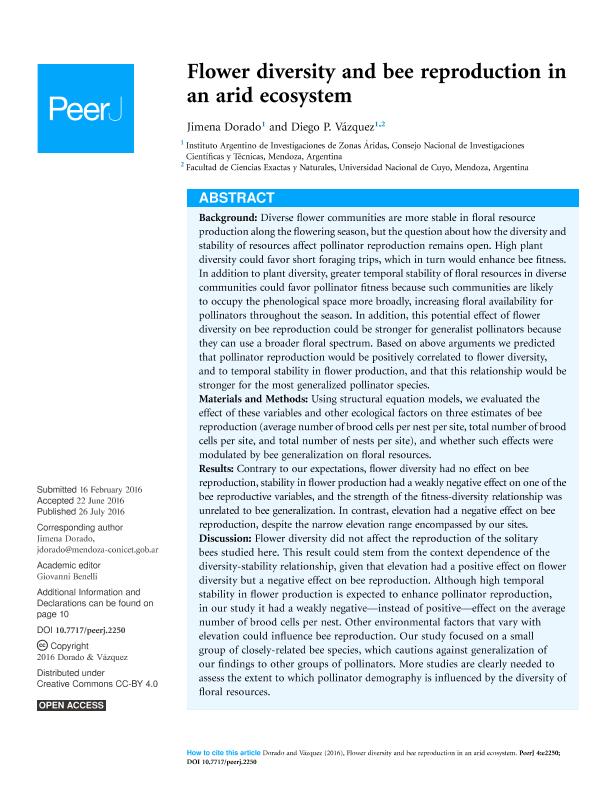Mostrar el registro sencillo del ítem
dc.contributor.author
Dorado, Jimena

dc.contributor.author
Vazquez, Diego P.

dc.date.available
2018-05-18T19:52:47Z
dc.date.issued
2016-06
dc.identifier.citation
Dorado, Jimena; Vazquez, Diego P.; Flower diversity and bee reproduction in an arid ecosystem.; PeerJ, Inc ; PeerJ; 2016; 4; 6-2016; 1-13; e2250
dc.identifier.issn
2376-5992
dc.identifier.uri
http://hdl.handle.net/11336/45635
dc.description.abstract
Background: Diverse flower communities are more stable in floral resourceproduction along the flowering season, but the question about how the diversity and stability of resources affect pollinator reproduction remains open. High plant diversity could favor short foraging trips, which in turn would enhance bee fitness.In addition to plant diversity, greater temporal stability of floral resources in diverse communities could favor pollinator fitness because such communities are likely to occupy the phenological space more broadly, increasing floral availability for pollinators throughout the season. In addition, this potential effect of flower diversity on bee reproduction could be stronger for generalist pollinators because they can use a broader floral spectrum. Based on above arguments we predicted that pollinator reproduction would be positively correlated to flower diversity, and to temporal stability in flower production, and that this relationship would be stronger for the most generalized pollinator species.Materials and Methods: Using structural equation models, we evaluated theeffect of these variables and other ecological factors on three estimates of bee reproduction (average number of brood cells per nest per site, total number of brood cells per site, and total number of nests per site), and whether such effects were modulated by bee generalization on floral resources.Results: Contrary to our expectations, flower diversity had no effect on bee reproduction, stability in flower production had a weakly negative effect on one of the bee reproductive variables, and the strength of the fitness-diversity relationship was unrelated to bee generalization. In contrast, elevation had a negative effect on bee reproduction, despite the narrow elevation range encompassed by our sites.Discussion: Flower diversity did not affect the reproduction of the solitary bees studied here. This result could stem from the context dependence of the diversity-stability relationship, given that elevation had a positive ffect on flower diversity but a negative effect on bee reproduction. Although high temporalstability in flower production is expected to enhance pollinator eproduction,in our study it had a weakly negative?instead of positive?effect on the veragenumber of brood cells per nest. Other environmental factors that vary withelevation could influence bee reproduction. Our study focused on a smallgroup of closely-related bee species, which cautions against generalization ofour findings to other groups of pollinators. More studies are clearly eeded toassess the extent to which pollinator demography is influenced by the iversity offloral resources.
dc.format
application/pdf
dc.language.iso
eng
dc.publisher
PeerJ, Inc
dc.rights
info:eu-repo/semantics/openAccess
dc.rights.uri
https://creativecommons.org/licenses/by/2.5/ar/
dc.subject
Pollination
dc.subject
Flower Diversity
dc.subject
Bee Fitness
dc.subject.classification
Otras Ciencias Biológicas

dc.subject.classification
Ciencias Biológicas

dc.subject.classification
CIENCIAS NATURALES Y EXACTAS

dc.title
Flower diversity and bee reproduction in an arid ecosystem.
dc.type
info:eu-repo/semantics/article
dc.type
info:ar-repo/semantics/artículo
dc.type
info:eu-repo/semantics/publishedVersion
dc.date.updated
2018-04-18T17:51:43Z
dc.journal.volume
2016
dc.journal.number
4
dc.journal.pagination
1-13; e2250
dc.journal.pais
Estados Unidos

dc.description.fil
Fil: Dorado, Jimena. Consejo Nacional de Investigaciones Científicas y Técnicas. Centro Científico Tecnológico Conicet - Mendoza. Instituto Argentino de Investigaciones de las Zonas Áridas. Provincia de Mendoza. Instituto Argentino de Investigaciones de las Zonas Áridas. Universidad Nacional de Cuyo. Instituto Argentino de Investigaciones de las Zonas Áridas; Argentina
dc.description.fil
Fil: Vazquez, Diego P.. Consejo Nacional de Investigaciones Científicas y Técnicas. Centro Científico Tecnológico Conicet - Mendoza. Instituto Argentino de Investigaciones de las Zonas Áridas. Provincia de Mendoza. Instituto Argentino de Investigaciones de las Zonas Áridas. Universidad Nacional de Cuyo. Instituto Argentino de Investigaciones de las Zonas Áridas; Argentina
dc.journal.title
PeerJ
dc.relation.alternativeid
info:eu-repo/semantics/altIdentifier/doi/http://dx.doi.org/10.7717/peerj.2250
dc.relation.alternativeid
info:eu-repo/semantics/altIdentifier/url/https://peerj.com/articles/2250/
Archivos asociados
